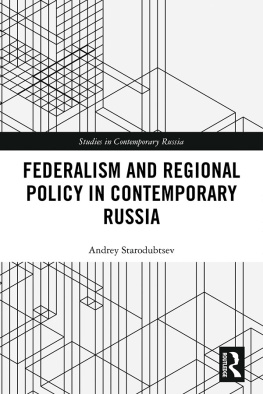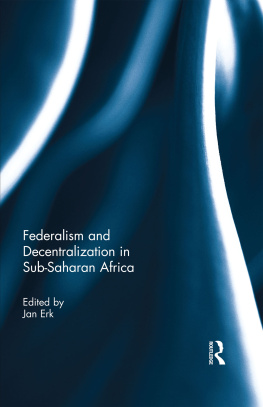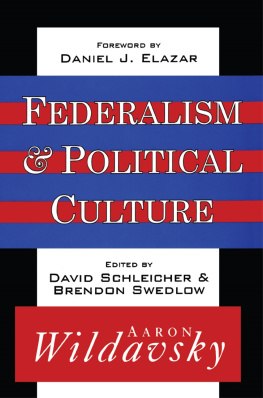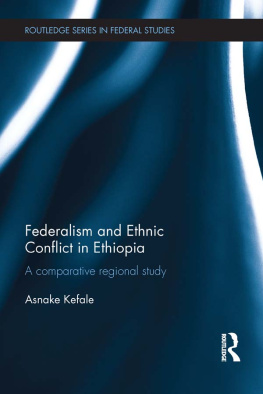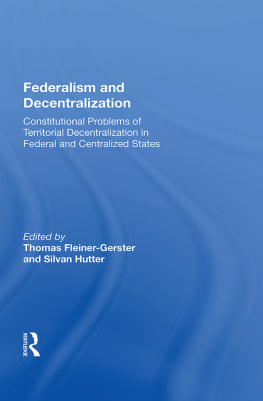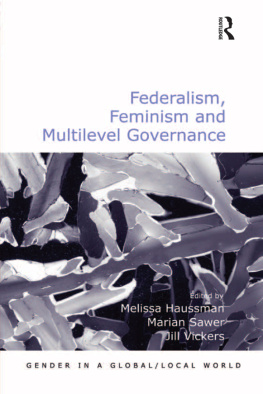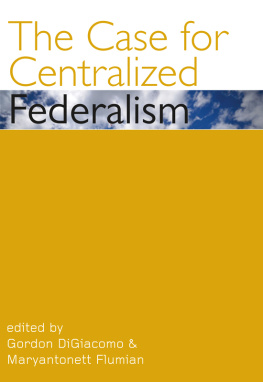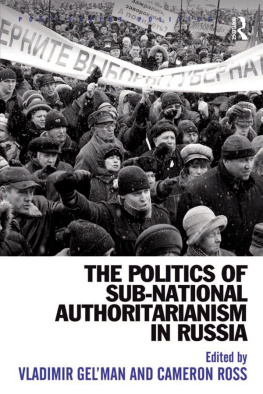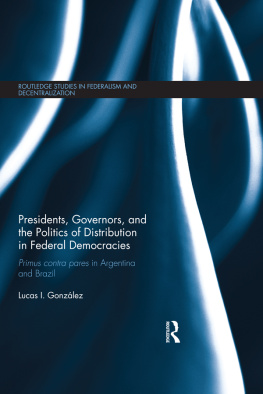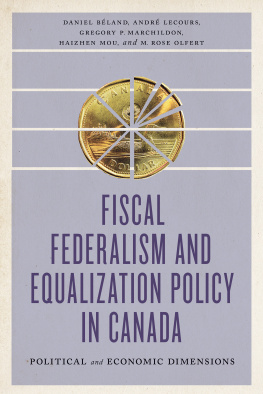Federalism and Regional Policy in Contemporary Russia
How do Russian leaders balance the need to decentralize governance in a socially and politically complex country with the need to guarantee political control of the state?
Since the early 2000s Russian federal authorities have arranged a system of political control on regional elites and their leaders, providing a police control of special bodies subordinated by the federal center on policy implementation in the regions. Different mechanisms of fiscal federalism and investment policy have been used to ensure regional elites loyalty and a politically centralized but administratively decentralized system has been created.
Asking clear, direct, and theoretically informed questions about the relationship between federalism, decentralization, and authoritarianism, this book explores the political survival of authoritarian leaders, the determinants of policy formulation, and theories of federalism and decentralization, to reach a new understanding of territorial governance in contemporary Russia. As such, it is an important work for students and researchers in Russian studies and regional and federal studies.
Andrey Starodubtsev is a postdoctoral researcher at the Aleksanteri Institute, University of Helsinki, Finland. He collaborates with the Center for Modernization Studies, European University at St Petersburg and the Department of Political Science, National Research University Higher School of Economics St Petersburg, Russia. His expertise covers the issues of federalism and regional policy as well as the problems of governance and modernization in contemporary Russia.
Studies in Contemporary Russia
Series Editor: Markku Kivinen
Studies in Contemporary Russia is a series of cutting-edge, contemporary studies. These monographs, joint publications and edited volumes branch out into various disciplines, innovatively combining research methods and theories to approach the core questions of Russian modernisation; how do the dynamics of resources and rules affect the Russian economy and what are the prospects and needs of diversification? What is the impact of the changing statesociety relationship? How does the emerging welfare regime work? What is the role of Russia in contemporary international relations? How should we understand the present Russian political system? What is the philosophical background of modernisation as a whole and its Russian version in particular?
The variety of opinions on these issues is vast. Some see increasingly less difference between contemporary Russia and the Soviet Union while, at the other extreme, prominent experts regard Russia as a more or less normal European state. At the same time new variants of modernisation are espoused as a result of Russian membership of the global BRIC powers. Combining aspects of Western and Soviet modernisation with some anti-modern or traditional tendencies the Russian case is ideal for probing deeper into the evolving nature of modernisation. Which of the available courses Russia will follow remains an open question, but these trajectories provide the alternatives available for discussion in this ground-breaking and authoritative series.
The editor and the editorial board of the series represent the Finnish Centre of Excellence in Russian Studies: Choices of Russian Modernisation.
For a full list of titles in this series, please visit www.routledge.com/series/ ASHSER-1421
Authoritarian Modernization in Russia
Ideas, Institutions, and Policies
Edited by Vladimir Gelman
Philosophical and Cultural Interpretations of Russian Modernisation
Edited by Katja Lehtisaari and Arto Mustajoki
The Other Russia
Local Experience and Societal Change
Leo Granberg and Ann-Mari Stre
Federalism and Regional Policy in Contemporary Russia
Andrey Starodubtsev
Federalism and Regional Policy in Contemporary Russia
Andrey Starodubtsev
First published 2018
by Routledge
2 Park Square, Milton Park, Abingdon, Oxon OX14 4RN
and by Routledge
711 Third Avenue, New York, NY 10017
Routledge is an imprint of the Taylor & Francis Group, an informa business
2018 Andrey Starodubtsev
The right of Andrey Starodubtsev to be identified as author of this work has been asserted by him in accordance with sections 77 and 78 of the Copyright, Designs and Patents Act 1988.
All rights reserved. No part of this book may be reprinted or reproduced or utilized in any form or by any electronic, mechanical, or other means, now known or hereafter invented, including photocopying and recording, or in any information storage or retrieval system, without permission in writing from the publishers.
Trademark notice: Product or corporate names may be trademarks or registered trademarks, and are used only for identification and explanation without intent to infringe.
British Library Cataloguing in Publication Data
A catalogue record for this book is available from the British Library
Library of Congress Cataloging in Publication Data
A catalog record for this book has been requested
ISBN: 978-1-472-46150-6 (hbk)
ISBN: 978-1-315-58206-1 (ebk)
Typeset in Times New Roman
by Wearset Ltd, Boldon, Tyne and Wear
To Anna Fomina, my best friend and partner, with love and gratitude
Contents
Figures
Tables
Preface
In his classic book on federalism (1964), William Riker presented a brief two-page analysis of the process of the Soviet Unions formation as a federal state, setting it alongside not only Yugoslavia, but also West Germany, Austria, and Switzerland. In response to the obvious question from all those who were surprised by the statement that an unfree state, one practicing mass terror and forced displacement of peoples, as a polity, complied with the principles of self-rule and shared rule, Riker noted:
Since 1923 the Soviet Union has been highly centralized and for that reason many scholars have refused to call it a federalism. This refusal is, however, merely the expression of the American-Commonwealth mythology that federalism ought to prevent tyranny. Since the Soviet Union preserved all the features of federalism, the mere fact that its federalism fails to prevent tyranny should not lead to casting it out of the class of federalism. Rather it should lead to a re-evaluation of what federalism means and implies.
(Riker, 1964: 3940)
Although I completely disagree with the statement that the Soviet Union preserved all the features of federalism, I have always interpreted this paragraph as Riker suggesting that we should examine the features of territorial governance in states that are simultaneously complex (with a large territory, plural society, etc.), and not democratic. It is the desire to understand how one should manage a country that, though born to be a federation, has not realized the federal canon, that compelled me to write this work.
This book is focused on Russia, a country that claims a federal structure in its constitution and its full name, but which has not for a single day been consistent with the classic principles of federalism. For many years, Russia has served as an example of the contemporary authoritarian state for the world of political science. The shift in politics research from studying the formation, development, and changes of its political regime to studying how that regime influences the functioning of the state and society has reserved Russias position as a crucial case for many years to come. For me, the Russian case is important because it clearly shows how the central government forms a territorial governance system as the authoritarian regime grows stronger, how it solves its immediate administrative tasks, and what political constraints it frequently faces.

